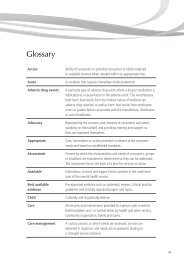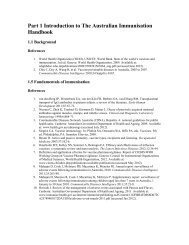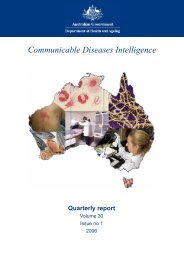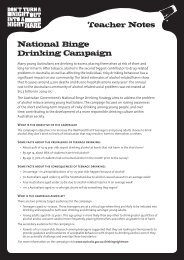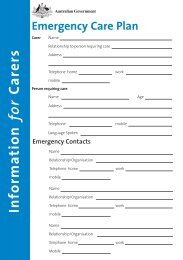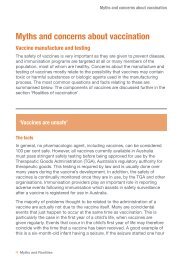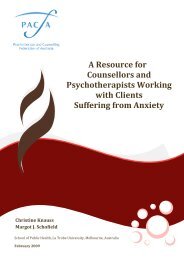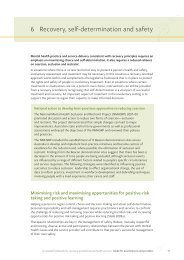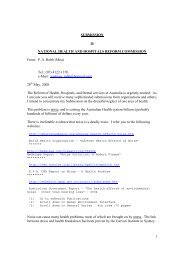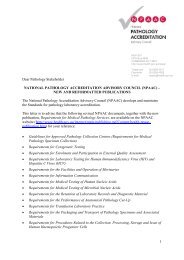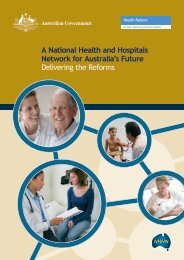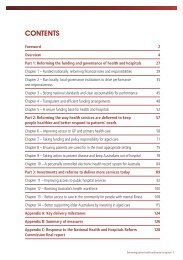National Amphetamine-Type Stimulant Strategy Background Paper
National Amphetamine-Type Stimulant Strategy Background Paper
National Amphetamine-Type Stimulant Strategy Background Paper
You also want an ePaper? Increase the reach of your titles
YUMPU automatically turns print PDFs into web optimized ePapers that Google loves.
106<br />
only significant difference was in the uptake of counselling, which was greater in the<br />
dexamphetamine group. The most serious adverse consequence of dexamphetamine cited<br />
has been the potential development of psychotic symptoms, particularly for those who have<br />
experienced amphetamine-induced psychosis. Another potential risk is the diversion of<br />
prescribed amphetamine (Shearer et al., 2002). On the other hand, some clinical trials have<br />
reported that such risks do not necessarily eventuate in adverse outcomes (e.g., Carnwath<br />
et al., 2002). Further research is currently underway, in South Australia, which involves<br />
a randomised double blind placebo controlled trial of dexamphetamine as maintenance<br />
treatment for amphetamine dependence.<br />
Aside from dexamphetamine, more recently both methylphenidate (e.g., Ritalin) and the<br />
antidepressant bupropion (e.g., Zyban) have been studied as potential amphetamine<br />
substitutes. Tiihonen and colleagues (2007) compared aripiprazole, a partial dopamine<br />
agonist, oral methylphenidate and a placebo among a sample of intravenous meth/<br />
amphetamine users. They reported that while aripiprazole was associated with significantly<br />
more amphetamine-positive urine samples, methylphenidate was associated with<br />
significantly fewer such samples. Bupropion is currently being trialled through several<br />
phases and has been shown to decrease subjective effects of methamphetamine and<br />
reduce cravings (Newton et al., 2006).<br />
At present, evaluations suggest that ATS users find services offering substitution therapy<br />
attractive when offered in addition to advice and counselling, and results from international<br />
trials indicate that pharmacological treatment is most effective when used in conjunction<br />
with psychosocial intervention (Mattick & Darke, 1995). Thus, from both the perspective of<br />
the consumer and as indicated by the research, safe and effective medication potentially<br />
represents a valuable adjunct to psychosocial interventions that may enhance both<br />
participation and retention. However, as noted in the written submission from NDARC:<br />
NDARC, in collaboration with St Vincents’ Hospital and the Kirketon Road Centre,<br />
conducted the first randomised controlled trial of dexamphetamine as a substitute for<br />
methamphetamine dependence (Shearer et al., 2001). This trial found modest benefits<br />
from dexamphetamine treatment which needed to be confirmed in larger trials. … Overall,<br />
existing evidence suggests that modest benefits from dexamphetamine substitution are<br />
outweighed by problems associated with this treatment, including diversion and sideeffects<br />
from interactions with concurrent illicit drug use (Mattick & Darke, 1995).<br />
Antidepressants<br />
Depression is commonly associated with ATS use, sometimes predating use, and also<br />
emerging as a consequence of use. As noted by Shearer and Gowing (2004):<br />
Antidepressants have been investigated in the treatment of comorbid depression,<br />
depressive symptomatology associated with psychostimulant withdrawal, or for their<br />
dopamine agonist properties (p.121).<br />
The range of trials, with various agents, has provided equivocal results. One interpretation<br />
of the data is that those with pre-existing affective disorders may be responsive to<br />
antidepressant treatment, whereas those with symptoms that emerge as a consequence



